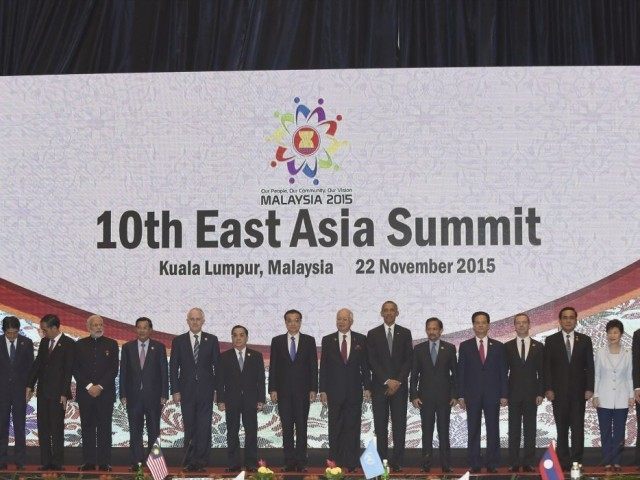This morning’s key headlines from GenerationalDynamics.com
- China blocks Miss World Canada from attending Miss World pageant
- ASEAN leaders harshly criticize China over South China Sea actions
- Occupied Crimea declares state of emergency after electricity is cut
China blocks Miss World Canada from attending Miss World pageant

Anastasia Lin, 25, Miss World Canada
China is apparently blocking Anastasia Lin, 25, the winner of Miss World Canada, from attending the Miss World pageant. Born in China, Lin has been an outspoken critic of China’s human rights abuses.
Lin is apparently not going to receive the letter from China inviting her to the pageant, which means that she cannot apply for a visa. The opening ceremony takes place on Monday, but she still hopes to receive the letter in time to attend the competition a few days later.
After she won the competition earlier this year, Lin’s father was contacted by Chinese security forces. They threatened that there would be consequences if Lin continued to speak out. As her father still lives in China, Lin is concerned. “Dad’s really scared. He doesn’t really dare to talk to me as he worries his phone is tapped. He doesn’t speak his mind anymore.” The Shanghaiist and BBC
ASEAN leaders harshly criticize China over South China Sea actions
While the Western world’s eyes have been riveted on the European terror news, tensions over China’s actions in the South China Sea have been surging at the annual summit meeting of the Association of South East Asian Nations (ASEAN), currently being held in Kuala Lumpur, Malaysia. In fact, week’s terrorist attack in a hotel in Bamako, the capital city of Mali, resulted in the deaths of three Chinese businessmen. The ASEAN summit meeting had been expected to discuss global terrorism, but the South China Sea pushed those matters into the background.
China received criticism from almost everyone. The harshest critic of China was outgoing Philippines President Benigno Aquino, who revealed that China had repeatedly been fishing in Philippine waters, and even worse, targeting endangered marine life covered by the Convention on International Trade in Endangered Species. According to Aquino:
We had been asked not to make these incidents public, and we agreed in an effort to de-escalate the situation. However, the incidents did not cease.
In addition to going public about these and other incidents of aggression by China, Aquino said that the region’s stability and prosperity were under threat “by unilateral actions such as the massive reclamation and building of structures on features in the Spratly islands.” He said such alarming developments have urgent and far-reaching implications in the region and the international community, and that ASEAN must not allow any country – “no matter how powerful” – to claim an entire sea as its own and use force and intimidation to send its message across.
Japan’s prime minister Shinzo Abe also criticized China’s land reclamation and suggested that Japan might send its Navy to the South China Sea:
With regard to activity by the Self-Defense Forces in the South China Sea, I will consider it while focusing on what effect the situation has on Japan’s security.
However, a Japanese government spokesman said later that there were no plans to change policy at the present time.
According to president Barack Obama, also attending the meeting:
Many leaders spoke about the need to uphold international principles, including the freedom of navigation, and overflight and the peaceful resolution of disputes.
My fellow leaders from Japan, Australia and the Philippines have reaffirmed that our treaty alliances remained the foundation of regional security. The United States is boosting our support for the Philippines maritime capabilities and those of our regional partners. […]
For the sake of regional stability, claimants should halt reclamation, new construction, and militarization of disputed areas.
During the meeting, Indonesia’s president Joko Widodo and South Korea’s president Park Geun-hye and other ASEAN leaders all criticized China’s actions in the South China Sea.
China’s Premier Li Keqiang evaded answering questions related to the subject, but has previously blamed the United States for “provocations” and “meddling.” In a statement reported by China’s media, Li said:
In recent years, the South China Sea disputes, which should have been addressed by directly concerned countries through negotiation and talks, have been played up to become a problem concerning the South China Sea’s peace and stability and the freedom of navigation.
Nikkei and Philippine Star and Bloomberg
Occupied Crimea declares state of emergency after electricity is cut
Occupied Crimea has declared a state of emergency after the entire peninsula was plunged into darkness because the transmission towers (pylons) carrying electricity lines from Ukraine were sabotaged on Friday and Sunday.
It is believed that the pylons were blown up by Ukrainian nationalists and Crimean Tatars opposed to Russia’s annexation of Crimea. In 2014, Russian army troops invaded Crimea and annexed the peninsula to Russia. Crimea is the homeland to ethnic Tatars who have been marginalized by the Russian occupation.
Generators are supplying power for vital services like hospitals and communications. Most of the nearly 2 million people living in Crimea remain without electricity. Ukraine’s Ministry of Energy and Coal Industry promised a restoration within four days. Euro News and Ukraine Today
KEYS: Generational Dynamics, Anastasia Lin, Miss World Canada, China, Association of South East Asian Nations, ASEAN, Kuala Lumpur, Malaysia, Mali, Bamako, South China Sea, Philippines, Benigno Aquino, Convention on International Trade in Endangered Species, Japan, Shinzo Abe, Indonesia, Joko Widodo, South Korea, Park Geun-hye, Li Keqiang, Ukraine, Crimea, Tatars
Permanent web link to this article
Receive daily World View columns by e-mail

COMMENTS
Please let us know if you're having issues with commenting.